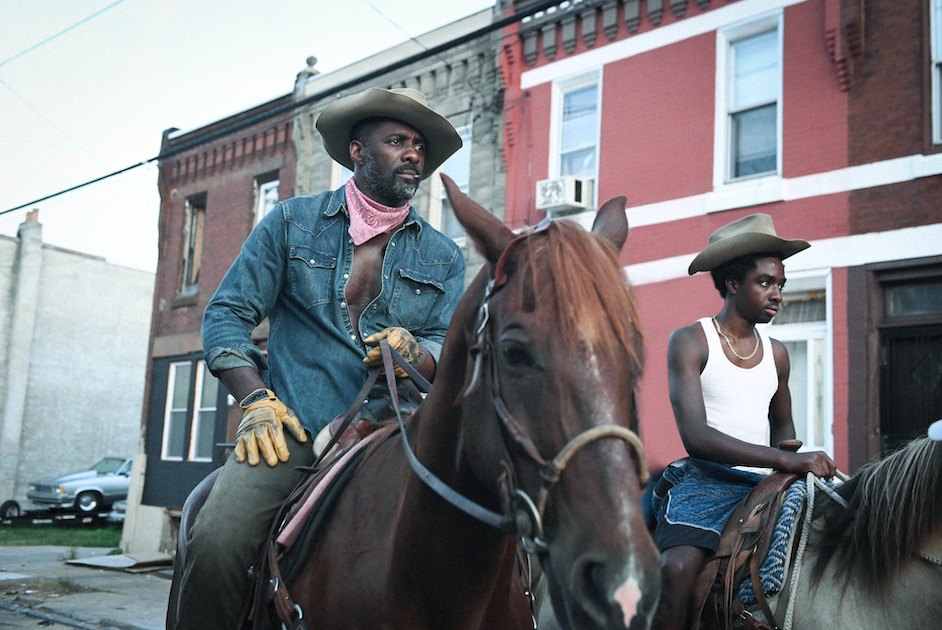There is a moment of surreal wonder near the start of Concrete Cowboy, the TIFF premiere co-starring Idris Elba, that is never equaled again, a sequence of unexpected radiance conjuring a sense of astonishment. A troubled teenager has been sent from Detroit to Philadelphia to spend the summer with his long-absent father. He arrives at night to a nearly empty, rather foreboding street. Eventually he finds his (seemingly) menacing father and is led into a ramshackle, messy home. Suddenly he sees a large horse and responds appropriately: “There’s a horse… in your house.”
It’s a surreal, beautifully shot scene. If only Concrete Cowboy had more moments like it. This is not to say Cowboy is a poor film—it is, in fact, watchable, well-acted, occasionally moving. It’s also overly predictable and never transcends the tropes of the standard coming-of-age drama, making for a forgettable disappointment.
While the film has its share of modest successes, it is hard not to come to this conclusion when things look so promising on paper. Consider that Concrete Cowboy is centered on the world of black horse trainers in Philadelphia and based on Greg Neri’s acclaimed novel Ghetto Cowboy. It features the charismatic Idris Elba, ideally cast as an urban cowboy, and stars Caleb McLaughlin, the talented young actor who plays Lucas on Stranger Things. And it’s the directorial debut of Ricky Staub, known for acclaimed short film The Cage.
Staub proves he is capable of creating moments of real visual splendor—a shot of Elba and his cohorts galloping down city streets is stunning. And Staub draws a powerful lead performance from McLaughlin as Cole, the aforementioned troubled teen. His father is well-played by Elba, but it is a poorly written role and this is McLaughlin’s show, an actor who takes advantage of it. But for any fine performances and visual elegance, Staub and Dan Walser’s script is simply not up to par. It is here that Concrete Cowboy falls apart.
One issue is that we never get a real sense of Cole’s issues. As the film begins, his exasperated mother (Elizabeth Priestley, making strong impressions in just a few scenes) is called in to pick Cole up from school for being involved in “another fight.” “You are drowning out here,” she tells him. “You are going to drown.” And yet the Cole we see is no juvenile delinquent. He is a thoughtful young man who, it’s clear, is often alone. McLaughlin plays him with just the right mix of anger and bewilderment, and while Cole never seems quite as bad as we’ve been told, he is most certainly in need of a change in scenery.
He gets one, to put it mildly. His father can almost always be found at the Fletcher Street Stables, tending to horses or hanging out with a group of neighborhood friends. These folks are slow to accept Cole, but he is just as slow to warm to them. He connects with a childhood friend (Jharrel Jerome, so unforgettable in Moonlight), and is soon caught up in drug dealing. At the same time, he works the stables and attempts to find his place in this new environment. All of these sequences feature an impressive use of locations and geography; the viewer develops a real sense of the neighborhood map.
The finest sequences are the most grounded moments — sitting around the fire, working in the stable. They feel beautifully accurate, and drawn from real experiences. There is a powerhouse scene between Cole and his father in which Cole points out that the horses are treated better than he is; it has a spark that’s missing in much of the film. And a sequence in which an escaped horse must be tamed is gripping. It leads to the film’s loveliest moment, perhaps its most resonant.
Then there’s still about 45 minutes left in Concrete; no exaggeration to say it’s all downhill from there. A drug deal gone wrong lacks urgency; viewers have been down this road so many times, in so many films. The final half hour lurches along, promising some type of transcendence that doesn’t come. And an emotional ending simply doesn’t connect. Cole’s growth is clear but lacks real impact, despite McLaughlin’s efforts.
What we are left with, then, is adequate entertainment—well-made, well-cast. For Caleb McLaughlin, it is further evidence of acting abilities, and while more Elba would have helped, he gives his usual sturdy performance. Overall, Concrete Cowboy feels like a missed opportunity to truly ride into a fascinating subculture. It’s an admirable effort, but not a successful one.
Concrete Cowboy premiered at the Toronto International Film Festival.

